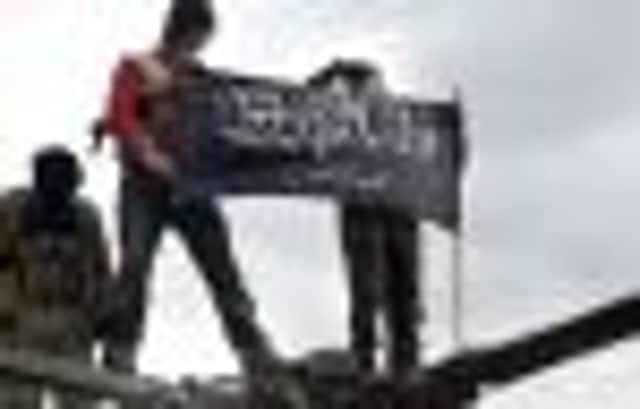Fears as Syria rebels formally join with al-Qaeda


The leader of the Islamic State of Iraq, Abu Bakr al-Baghdadi, said in an audio message posted on Islamist websites late on Monday that the two groups would operate as the Islamic State of Iraq and the Levant.
He said: “It’s now time to declare in front of the people of the Levant and the world that al-Nusra Front is but an extension of the Islamic State of Iraq and part of it. We thus declare … the cancellation of the name of the Islamic State of Iraq and the name of al-Nusra Front and grouping them together under one name, the Islamic State of Iraq and the Levant.”
Advertisement
Hide AdAdvertisement
Hide AdThe militant Islamist element of the Syrian conflict poses a quandary for Western powers and their Arab allies, which favour president Bashar al-Assad’s overthrow but are alarmed at the growing power of Sunni Muslim jihadi fighters whose fiercely anti-Shiite ideology has fuelled sectarian tensions in the Middle East.
Abu Bakr al-Baghdadi’s statement said his group had deployed fighters and sent funds to local al-Nusra cells set up in Syria to lay the groundwork for the armed uprising – which grew out of anti-Assad protests that erupted in March 2011 – but that it had refrained from announcing the link for security reasons.
No statement on the merger has come from al-Nusra Front.
The Front burst into prominence early last year, when it claimed responsibility for several powerful bombings in the Syrian capital, Damascus, and the northern city of Aleppo.
Since then it has won recruits among rebels who see it as the most effective fighting force against Mr Assad’s troops, and taking a leading role in capturing territory in the north, south and east of Syria.
In one day in November, US intelligence group SITE said the al-Nusra Front had claimed responsibility for 45 attacks in Damascus, Deraa, Hama and Homs provinces that reportedly killed dozens of people, including 60 in a single suicide bombing.
In December, the US State Department designated the al-Nusra Front as a foreign terrorist organisation.
At least 70,000 people have been killed since protests led by Syria’s Sunni majority broke out against Mr Assad, whose minority Alawite sect is an offshoot of Shiite Islam.
The al-Nusra Front has gained support as the violence and misery in Syria radicalises a population used to living under Mr Assad’s secular rule. Experts have long said the Front was receiving support from al-Qaeda-linked insurgents in neighbouring Iraq.
Advertisement
Hide AdAdvertisement
Hide AdIn Iraq’s remote western desert region next to Syria, where cross-border Sunni tribal ties are strong, Iraqi security officials have said since last year that Islamic State of Iraq was regrouping and recruiting.
Al-Qaeda’s Iraqi wing and Syria’s Sunni Islamist insurgents share a hatred for Mr Assad and for Iraqi prime minister Nuri al-Maliki’s Shiite-led government, which they see as oppressors of Sunnis in both countries.
Insurgent recruitment has been spurred by growing protests against Mr Maliki among Sunnis, who feel sidelined since the fall of Saddam Hussein and the rise of the Shiite majority.
Al-Qaeda In Iraq, which suffered serious setbacks before US troops left at the end of 2011, has bounced back with a surge in suicide bombings and co-ordinated attacks across Iraq this year, including an ambush which killed 48 Syrian soldiers who had fled across the border.
Security officials say Anbar province, once the heartland of al-Qaeda’s war on American troops, is again becoming a haven for the group as Iraqi forces struggle to cover the vast territory without US air support.
A porous border and the remote caves and hills of the desert make ideal territory for insurgents to evade Iraqi security forces and smuggle arms and fighters between Iraq and Syria.